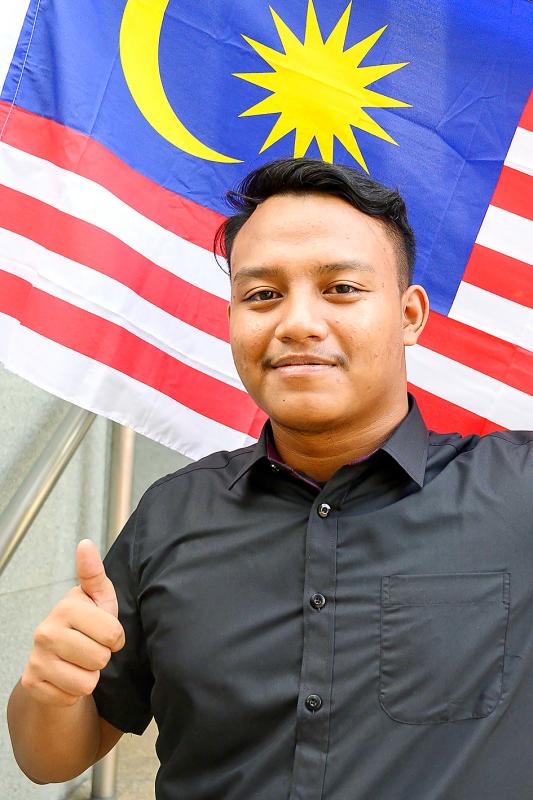A rising e-sports player has won a years-long battle for Malaysian citizenship, a victory that allows him to compete internationally and highlights problems faced by hundreds of thousands of stateless children in the country.
Muhammad Aiman Hafizi Ahmad was part of a team competing in the popular PlayerUnknown’s Battlegrounds (PUBG), which pits participants against each other in a virtual fight to the death.
However, when they won the chance to take part in two tournaments in China last year, the 20-year-old had to skip them — he could not travel overseas, as he was officially stateless.

Photo: AFP
Aiman was born in Malaysia to an Indonesian mother and an unknown father, and adopted by local parents, but he had never been recognized as a Malaysian citizen and could not get a passport.
He had applied to become Malaysian years earlier and was refused, but after being forced to miss the tournaments, he renewed his efforts by launching a widely publicized legal battle. Authorities then decided to grant him citizenship, making the court fight unnecessary.
“I have waited to get this certificate of citizenship for eight years,” Aiman said, delightedly clutching the document on Tuesday in the administrative capital Putrajaya.
With the legal battle behind him, Aiman said that he looked forward to “resuming playing in the competitive scene.”
Aiman was adopted by a couple from Malaysia’s ethnic Malay Muslim majority in the town of Taiping, in the central state of Perak.
Although his birth was later registered by his adoptive parents, his documents described him as stateless. As well as leaving him without a passport, this made it more difficult to get access to healthcare, education and work, and he could not even open a bank account.
Unlike some countries, Malaysia — which is home to millions of migrant workers from poorer parts of Asia — does not automatically grant citizenship to people born there.
At least 290,000 stateless children live in Malaysia, many with parents from Indonesia, the Philippines and Myanmar, according to media reports citing officials.
Malaysia’s constitution says that the government can choose to register anyone under the age of 21 as a citizen, but Aiman’s lawyer, New Sin Yew, said that the process is “quite opaque and takes a very long time.”
“The fastest [application] can take about three years and the government often rejects applications without reasons,” he said. “I think if this case was not brought to the attention by the media, it would have been much more difficult.”
Aiman’s parents first tried to register him as a citizen when he was 12, but the application was refused.
He got into gaming by playing on his phone and discovered PUBG.
Aiman then started playing in PUBG competitions and joined a team, and hones his skills by practicing four to five hours a day.
He is hopeful for a bright future in e-sports.
“I want to make my family proud and my country, too,” he said. “That is my dream.”

‘IN A DIFFERENT PLACE’: The envoy first visited Shanghai, where he attended a Chinese basketball playoff match, and is to meet top officials in Beijing tomorrow US Secretary of State Antony Blinken yesterday arrived in China on his second visit in a year as the US ramps up pressure on its rival over its support for Russia while also seeking to manage tensions with Beijing. The US diplomat tomorrow is to meet China’s top brass in Beijing, where he is also expected to plead for restraint as Taiwan inaugurates president-elect William Lai (賴清德), and to raise US concerns on Chinese trade practices. However, Blinken is also seeking to stabilize ties, with tensions between the world’s two largest economies easing since his previous visit in June last year. At the
Nearly half of China’s major cities are suffering “moderate to severe” levels of subsidence, putting millions of people at risk of flooding, especially as sea levels rise, according to a study of nationwide satellite data released yesterday. The authors of the paper, published by the journal Science, found that 45 percent of China’s urban land was sinking faster than 3mm per year, with 16 percent at more than 10mm per year, driven not only by declining water tables, but also the sheer weight of the built environment. With China’s urban population already in excess of 900 million people, “even a small portion

UNSETTLING IMAGES: The scene took place in front of TV crews covering the Trump trial, with a CNN anchor calling it an ‘emotional and unbelievably disturbing moment’ A man who doused himself in an accelerant and set himself on fire outside the courthouse where former US president Donald Trump is on trial has died, police said yesterday. The New York City Police Department (NYPD) said the man was declared dead by staff at an area hospital. The man was in Collect Pond Park at about 1:30pm on Friday when he took out pamphlets espousing conspiracy theories, tossed them around, then doused himself in an accelerant and set himself on fire, officials and witnesses said. A large number of police officers were nearby when it happened. Some officers and bystanders rushed

Beijing is continuing to commit genocide and crimes against humanity against Uyghurs and other Muslim minorities in its western Xinjiang province, U.S. Secretary of State Antony Blinken said in a report published on Monday, ahead of his planned visit to China this week. The State Department’s annual human rights report, which documents abuses recorded all over the world during the previous calendar year, repeated language from previous years on the treatment of Muslims in Xinjiang, but the publication raises the issue ahead of delicate talks, including on the war in Ukraine and global trade, between the top U.S. diplomat and Chinese